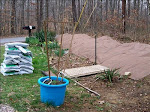The key to high quality sweet corn is rapid growth, adequate soil moisture and nutrients, and harvesting the ears at optimum maturity.
When the corn is about 6 inches tall, thin short varieties to two feet apart and tall varieties to three feet apart. Although corn can be grown closer together than this, the roots are then more crowded and more watering and feeding are needed. Corn is a heavy user of nitrogen. Fertilize in the spring, again when the corn is eight inches tall and again when the plants are 18 inches tall. Hill soil around the plant roots to help support the stalks.
Watering is very important. Keep the soil evenly moist. Corn often grows so fast in hot weather that the leaves wilt because the roots can't keep the leaves supplied with moisture. Although corn requires much water, avoid getting water on the tassels. The pollen from the tassels must fall onto the corn silk to produce kernels, and if pollination does not occur, all that will grow is the cob. Weed early and keep the weeds cut back. Remember that corn has shallow roots, and a vigorous attack on the weeds may destroy the crop.
Watering is very important. Keep the soil evenly moist. Corn often grows so fast in hot weather that the leaves wilt because the roots can't keep the leaves supplied with moisture. Although corn requires much water, avoid getting water on the tassels. The pollen from the tassels must fall onto the corn silk to produce kernels, and if pollination does not occur, all that will grow is the cob. Weed early and keep the weeds cut back. Remember that corn has shallow roots, and a vigorous attack on the weeds may destroy the crop.



















